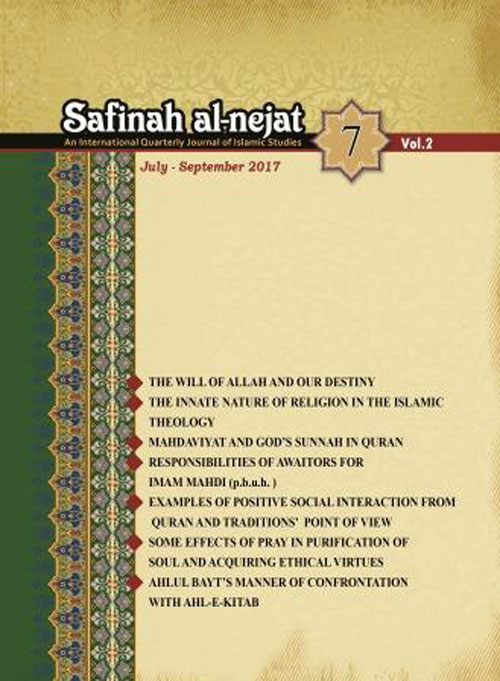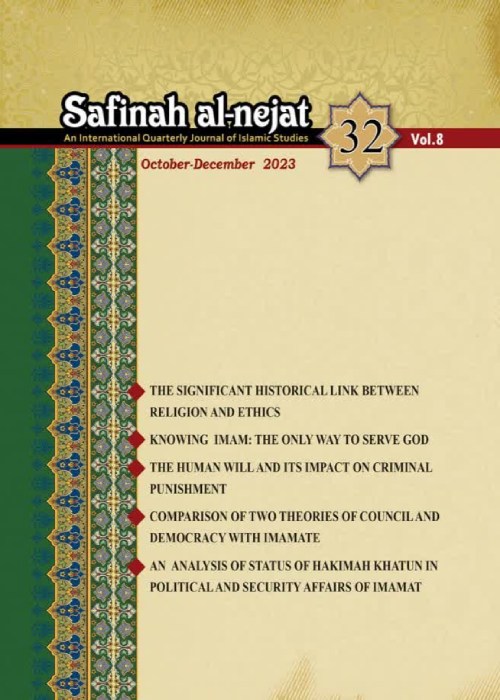فهرست مطالب

Safinah al-nejat
Volume:2 Issue: 7, Summer 2017
- تاریخ انتشار: 1396/10/25
- تعداد عناوین: 8
-
Page 5
-
Page 7In this part, it is shown that Allahs names (Asmaa) and attributes (Sifaat) are of His supreme creations. The place of the manifestation of the Allahs attributes and qualities is discussed, including the states of satisfaction, dissatisfaction, mercy, wrath, sadness, etc., which are all parts of Allahs created will. Moreover, the meanings of medium of Allah, such as the face, eye, hand, and side that Allah attributed to Himself are discussed based on the evidence from the holy Quran and Hadith.Keywords: The names of Allah, His attributes, His medium, His actions
-
Page 25Fitrah is a specific state of beginning and is applied to the issues which are present at the time of the first creation of human beings and are not acquired. The claim of the present article is to show Islamic principles in three aspects of belief, act, and ethics are rooted in the first creation of human being and are inborn.Keywords: Fitrah, Tinat, Jobolat, logic, belief, act, morality, islam, religion, Tuhid
-
Page 32The author of the present article deals with sunnah of God, namely istikhlaf, Imtihan, Tamhis, istidraj, istidraj, and Imla according to Quran and traditions, then their relationship with mahdaviyat , disappearance and reappearance have been depicted.Keywords: Imam Mahdi, Mahdaviyat verses, Mahdaviyat, Quran authenticity, Quran, God's Sunnah, Istikhlaf, Imtihan, Tamhis, Istidraj, Imla
-
Page 50In contemporary society, some issues and principles which are of religious and practical essentials are covered by the shed of ignorance, and eventually they lose their importance. One of the fundamental beliefs which is of high importance and it should be considered, and it is felt to be needed more than any other time is the belief in imam Mahdi (may God hasten his reappearance) and reviving his remembrance and waiting his reappearance. These are regarded as religious duties. According to the sayings of our infallible imams, besides this fact that reappearance of imam Mahdi can be the relief of all good people, this waiting itself can be a relief and problem-solver and has constructive results for awaitor and society. The first part of the present article is a brief look over the birth, imams short and long hidden life and then the meaning of awaiting for imam and the importance of it according to the words of infallibles are mentioned. The second part is dealing with the moral effects of this waiting on people. The third part is allocated to the moral effects of this waiting on society. The forth part is dealing with the effects of the effects of this waiting psychological- wise.Keywords: waiting, awaitor, duties, effects of waiting, waiting for imam reappearance
-
Page 58positive social interactions are one of the basic pillars of each society and in Quran and traditions of Ahlul Bayt we observe significant guidelines concerning this issue. The goal of this study is to introduce examples of these interactions based on Quran and traditions. The research method is library-based. The examples of positive interactions are: interacting with others, interacting with friends, respecting people, having good temper, be kind, keeping promises, forgiving others, cooperation, security, and psychological and moral health in peoples interaction.Keywords: social interactions, social relationship, society
-
Page 74According to holy verses and traditions, pray has significant effect on purification of soul and acquiring moral virtues and spiritual states. In the following, a number of the most important effects has been offered in this article.Keywords: pray, educational effect, prohibition of evils
-
Page 80familiarity with the attitude of Ahlul Bayt in confrontation with Ahl-e-Kitab, not only can introduce them a role models in management but also can help to comprehend various aspects of Islamic teachings. In the present article, by referring to Islamic resources and providing examples the most important criteria of this issue is under study. These criteria are as ethic-based, wise and scientific-based, respect and kindness with Ahl-e-Kitab, justice-based and loyalty in treaties, preserving peace. These criteria had been manifested at the time of their rulership which they could not manifest when they had no official power; i.e. these virtues are not essentially governmental.Keywords: confrontation of Ahl Bayt with followers of Divine Faiths, Ahl-e-Kitab, Christianity, Jewism


